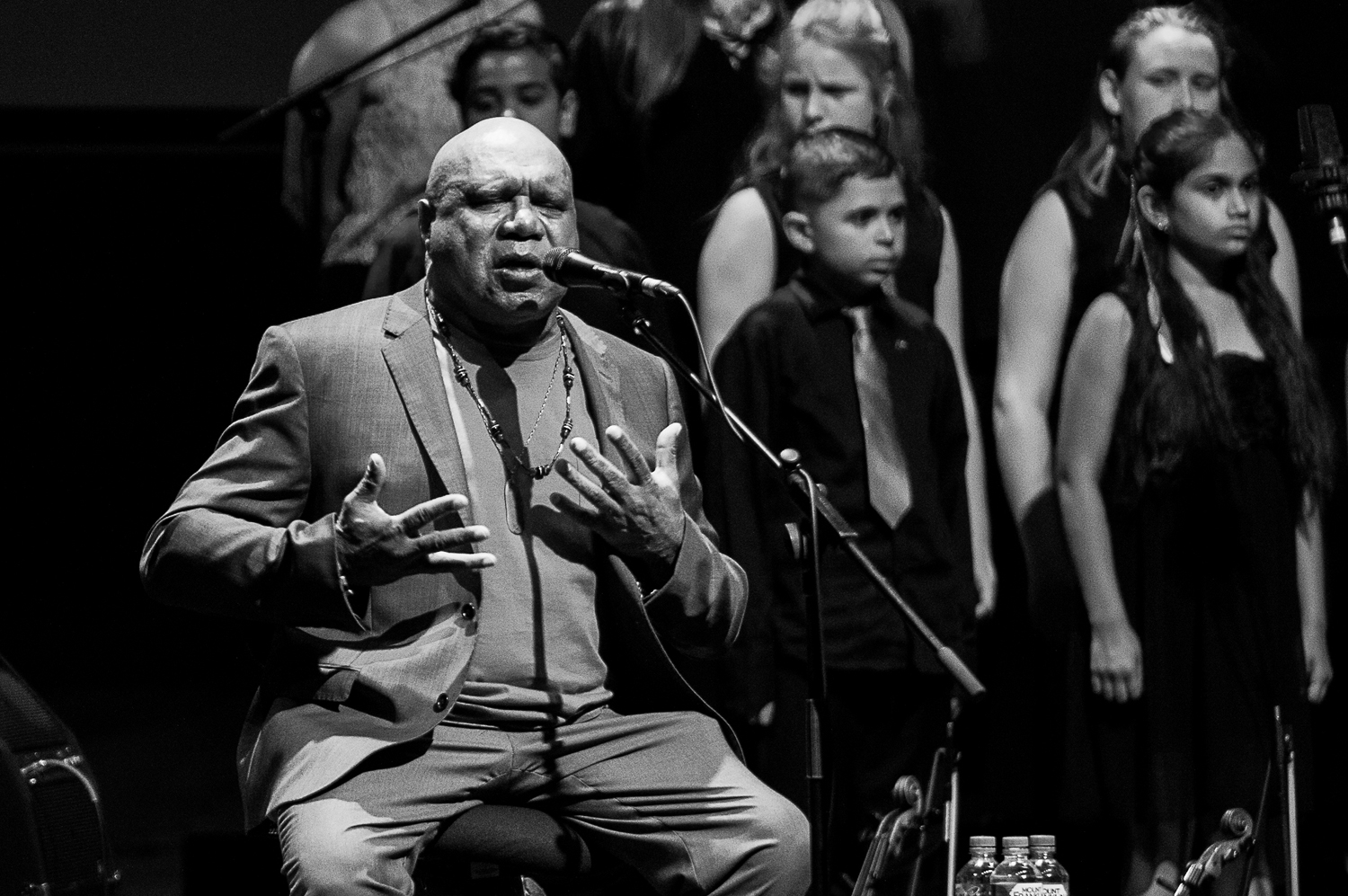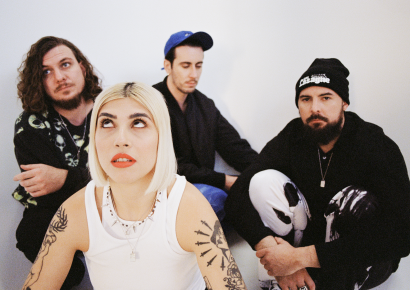Vale Archie Roach, 8 January 1956 – 30 July 2022.
Archie Roach’s sons, Amos and Eban, have given permission for their father’s name and image to be used “so that his legacy will continue to inspire”.
Last month, Gunditjmara (Kirrae Whurrong/Djab Wurrung), Bundjalung elder, songman and truth-teller Archie Roach AM performed a NAIDOC Week medley of Bob Marley hits – ‘Redemption Song’, ‘One Love’ and ‘Get Up, Stand Up’ – for triple j’s Like A Version. True to form, Uncle Archie shared his spotlight with three emerging stars: Larrakia, Kungarrakany and Thursday Island musician Marlon Motlop and Tulampanga Pakana musician Rulla Kelly-Mansell (who perform together as Marlon x Rulla), plus Kamilaroi and Wiradjuri songwriter Becca Hatch.
During a post-performance interview, Hatch acknowledged Archie as “a trailblazer for Indigenous artists and First Nations people” while Kelly-Mansell extolled, “He’s one of our most profound storytellers to ever be able to grace our shores and our country”.
Archie also performed his final single, ‘One Song’ – a “lullaby for humanity” that appears on his career-spanning 44-song collection, My Songs: 1983–2021 – for this segment:
Friend, long-time collaborator and Goanna frontman Shane Howard penned a moving tribute to Archie: “He carried the collective loss of his people, which is immense, on his broad shoulders. Sometimes you felt that the weight of that burden threatened to crush him. It would crush most people. But when Archie sang, he soared like an eagle and gave voice to all of that pain, suffering, loss, joy and inevitably, redemption. His great gift was that he did it in a way that liberated us all.”
Archie never seemed to tire of – or grow impatient with – his role as constant educator and spokesperson for the Stolen Generation. Within a tribute to Archie on Deborah Cheetham’s Facebook page, the opera singer writes: “The road ahead is much harder without him because he has been doing so much of the work for so long to elevate the spirit and integrity of our society aiming towards Australia becoming the best version of itself.”
His deeply personal, autobiographical street poetry recalls struggles with homelessness, addiction and, most famously, highlighted the impact of the forcible removal of Aboriginal and Torres Strait Islander peoples from their families. For many, hearing Archie’s signature song ‘Took The Children Away’ – which won an international Human Rights Achievement Award, a first for any songwriter – was their introduction to this awful part of Australia’s history.
“We can’t just pick and choose what we like from the history of this country. We have to tell the whole history and the truth. It’s the only way we can move forward” – Archie Roach
During a previous interview with this scribe, Archie said of ‘Took The Children Away’: “I’m just singing about what happened to a lot of children and I say at the end, ‘Yes, I came back,’ just, I suppose, to emphasise that I was part of that Stolen Generation as well. But I made it back, which was good. And unfortunately, some didn’t. I think about it a lot when I sing it – I perform it quite a bit, that song – and I think each time I sing it, when I sing that [line] at the end, I know it makes me feel better; it’s like redemption, you know?”
To mark the 30th anniversary of Charcoal Lane in 2020, Archie released The Songs Of Charcoal Lane, which contained new versions of his revered debut album’s ten impassioned songs. This extraordinary Gunditjmara and Bundjalung artist also celebrated 30 years since the release of this landmark record by making his debut as a YouTuber! For the ‘Back To Charcoal Lane’ series, Archie interviewed special guests from his kitchen table in regional Victoria – on his mother’s Gunditjmara ancestral lands – via Zoom.
While in discussion with Paul Kelly, Archie hilariously admitted that when they first met he mistook the singer-songwriter for a security guard.
After the late, great Steve Connolly saw him performing ‘Took The Children Away’ on the ABC TV series Blackout, Archie was chosen to open for Paul Kelly & The Coloured Girls at Melbourne Concert Hall (now Hamer Hall) in 1989. Pre-show, Paul visited Archie in his dressing room and – as Archie pointed out in their ‘Back To Charcoal Lane’ chat – was dressed in all black at the time, a colour scheme usually favoured by security guards. “Sorry I mistook you for security, brother!” Uncle Archie then apologised, laughter coursing through his entire being.
In his 2019 memoir, Tell Me Why, Archie writes about walking off stage following his two-song set: “The little security bloke had tears in his eyes as he shook my hand. It was a strange night.”
Kelly later recalled that after Archie concluded his two-song set with ‘Took The Children Away’ there was “dead silence”: “[Archie] thought that he bombed and just turned and walked off stage. [But] as he was walking off, this wave of applause grew and grew. The audience had been so stunned that it had taken them a while to respond; I’d never heard anything like it.”
In more recent years, Archie himself observed his gravelly timbre evoked Tom Waits. Archie’s world-weary quality added much gravitas to every single syllable sung and, anyway, who doesn’t love Tom Waits? His interpretive ability, honed through decades performing on stages the world over, regularly transformed Archie’s performances into life-changing events. Those fortunate enough to experience Archie’s healing magic in a live setting left feeling blessed to have witnessed his immense talent in its purest form, resplendent with bonus yarns delivering a forgiving, hopeful overall message.
“Sorry to hear of the death of the great Indigenous Australian songwriter and activist Archie Roach,” Billy Bragg tweeted. “His passing is not just a loss to Australia, but also to all of us who believe that music can be used as a tool to seek justice.”
Archie died at Warrnambool Base Hospital – on Gunditjmara land in south-west Victoria, his mother’s country – on 30 July, 2022; not far away from Framlingham Aboriginal Station, from which he was taken as a child aged just three.
During a 2019 interview, Archie discussed living near the coastal town of Warrnambool: “Not knowing Mum, but knowing she was a little girl here, when I go out there I feel like I’m walking where she would have walked.”
Thanks to the many specific geographical references – Gertrude Street, Smith Street, Swan Hill, Deniliquin… – littered throughout his Gold-certified, multiple-ARIA-Award-winning debut solo record, Charcoal Lane, Uncle Archie already sprang to mind whenever we roamed ‘Down City Streets’ he immortalised through song.
Now that he’s reunited with his soulmate Ruby Hunter – which makes our hearts sing – it’s up to us to carry Uncle Archie’s message of healing into the future.
“Big tree down. Weeping in the forest” – Paul Kelly

